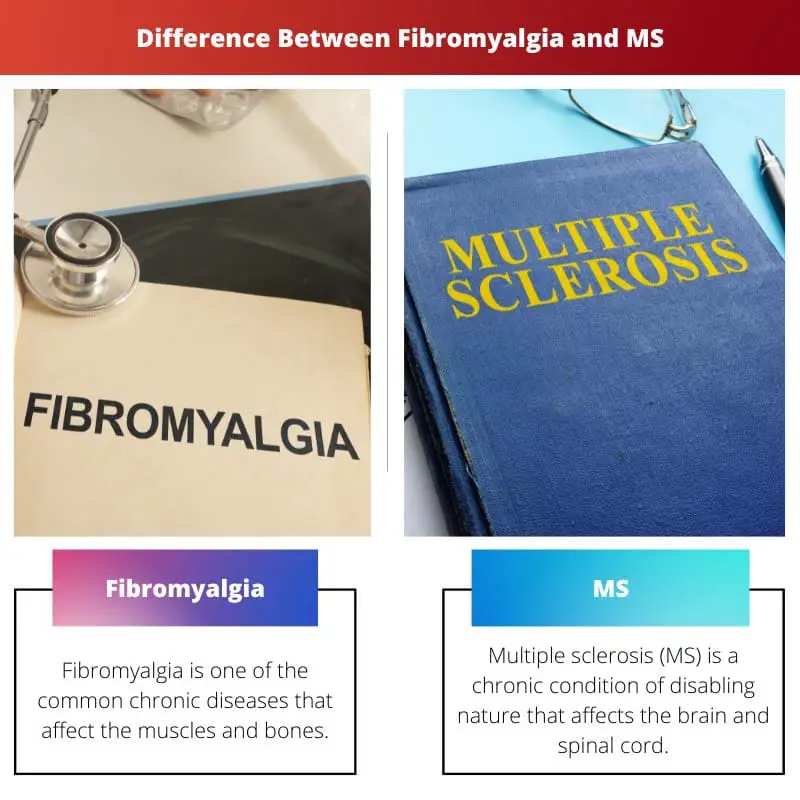Chronic pain is considered a lifelong disease that is quite common among women. Fibromyalgia and MS are two chronic diseases that affect the nerves.
These medical conditions have severe symptoms and can damage the nerves critically. Fibromyalgia causes stiffness and has other symptoms as well all over the body.
Key Takeaways
- Fibromyalgia is a chronic pain disorder, while multiple sclerosis (MS) is an autoimmune disease that affects the central nervous system.
- Fibromyalgia symptoms include widespread pain, fatigue, and cognitive difficulties, whereas MS symptoms vary widely, including muscle weakness, vision problems, and loss of coordination.
- There is no known cure for either condition, but treatments aim to manage symptoms and improve quality of life.
Fibromyalgia vs MS
Fibromyalgia is a chronic condition that causes widespread pain, tenderness, and fatigue. It can also cause other symptoms, such as headaches, difficulty sleeping, and cognitive difficulties. MS is a chronic autoimmune disease that affects the central nervous system. MS can cause various symptoms, including fatigue, muscle weakness, numbness or tingling in the limbs.

Fibromyalgia is a chronic condition that leads to fatigue, memory problem, and drowsiness. In this medical condition, severe pain is felt throughout the body.
Various risk factors are attached to this disease, including genetic factors, stress, trauma, and surgical interventions. The diagnosis depends on the tests and the patient’s history, although no specific treatment exists.
MS is a chronic autoimmune disease that affects nerve impulses and even blocks them. It affects the brain’s ability to regulate vision, talking, etc.
Various factors cause the development of this disease, including heredity factors, viruses, autoimmune diseases, and environmental factors. The detection and diagnosis of MS are comprised of various tests and medical history.
Comparison Table
| Parameters of Comparison | Fibromyalgia | MS |
|---|---|---|
| What is it | It is a chronic medical condition that causes pain throughout the body. | MS is a chronic disabling disease that affects the central nervous system. |
| Occurrence | Majorly affects people of the age group between 20-40 years. | Muscle pain, insomnia, depression, trouble in concentration, fatigue, dry mouth, headache, numbness, stiffness, and intense sensitivity |
| Symptoms | Visual disturbances, sensory and coordination disorders, fatigue, limbs numbness, dizziness, and sexual problems. | Physical Trauma, stress, and surgical intervention |
| Risk Factors | Visual disturbances, sensory and coordination disorders, fatigue, limb numbness, dizziness, and sexual problems. | Heredity and environmental factors or autoimmune disease |
| Treatment | Fibromyalgia is detected after examining the patient’s medical history. Other tests like blood tests and thyroid hormones are also suggested to avoid the possibility of other diseases. | Fibromyalgia is detected after examining the patient’s medical history. Other tests like blood tests, and thyroid hormones are also suggested to avoid the possibility of other diseases. |
| Diagnosis | Anti-inflammatory and non-steroidal have a better influence on cognitive function. The treatment also includes antidepressants and cognitive behavioural therapy. | Multiple tests are required to diagnose MS. This includes lumbar puncture, resonance imaging, and induced potentials. |
What is Fibromyalgia?
Fibromyalgia is a common chronic disease affecting the muscles and bones.
A Few consequences that lead to this disease are: if you are a woman because it affects women more often; if you have any mood disorder; genetic factor; PTSD; or if you rarely do any physical activity or exercise. Fibromyalgia has various symptoms and feels like tendinitis and bursitis.
Fibromyalgia symptoms include muscle pain, insomnia, depression, trouble concentrating, fatigue, dry mouth, headache, numbness, stiffness, and intense sensitivity. These symptoms are similar to other diseases; therefore, no specific test is applicable to detect fibromyalgia.
By analyzing the symptoms, doctors recommend the appropriate treatment. Mainly three drugs are approved to treat fibro pain.
What is MS?
Multiple sclerosis (MS) is a chronic disabling condition that affects the brain and spinal cord.
This medical condition impacts the myelin sheath and causes a problem in communication between the body and brain, which may also cause permanent damage to the nerves. The severity of the symptoms depends on the nerve affected and their extent.
The symptoms vary from one person to another. Common symptoms include visual disturbances, sensory and coordination disorders, fatigue, limb numbness, dizziness, and sexual problems.
Factors that lead to MS are heredity and environmental factors or autoimmune diseases. The diagnosis of this medical condition does not rely on a single test.
It comprised medical history and tests like lumbar puncture, resonance imaging, and induced potentials. To treat MS, immunomodulators, corticosteroids, and immunosuppressants, types of medications are prescribed.
Main Differences Between Fibromyalgia and MS
- Fibromyalgia and MS are chronic diseases that affect the body differently and are more diagnosed in women than men. Fibromyalgia is a chronic medical condition that causes pain throughout the body. On the contrary, Multiple sclerosis (MS) is a chronic disabling disease that affects the central nervous system.
- Every disease has some symptoms that indicate its presence. Fibromyalgia symptoms include muscle pain, insomnia, depression, trouble in concentration, fatigue, dry mouth, headache, numbness, stiffness, and strong sensitivity. MS, on the other side, has symptoms like visual disturbances, sensory and coordination disorder, fatigue, limbs numbness, dizziness, and sexual problems.
- The medical conditions result from some risk factors that stimulate a particular disease. Risk factors associated with Fibromyalgia are Physical trauma, stress, and surgical intervention. On the contrary, the risk factors of MS are Heredity and environmental factors or autoimmune disease.
- Fibromyalgia can be treated by using anti-inflammatory and non-steroidal as they have a better influence on cognitive function. The treatment also includes antidepressants and cognitive behavioral therapy. On the contrary, the medication and treatment of MS depend on the severity. Majorly doctors recommend immunomodulators and corticosteroids.
- Fibromyalgia is detected after examining the patient’s medical history. Other tests like blood tests, thyroid hormones are also suggested to avoid the possibility of other diseases. On the contrary, Multiple tests are required to diagnose MS. This includes lumbar puncture, resonance imaging, and induced potentials.

- https://www.ncbi.nlm.nih.gov/pmc/articles/PMC2919307/
- https://onlinelibrary.wiley.com/doi/abs/10.1111/j.1755-3768.2022.153

While the article presents the facts about fibromyalgia and MS, it lacks real-life experiences of patients. I believe it would have added more depth and perspective to the piece.
The author’s detailed explanation of fibromyalgia and MS is quite commendable. It’s a well-researched piece that can be a great source of information for many readers.
The article provides useful information about fibromyalgia and MS, and it’s an eye-opener regarding the symptoms and diagnosis of these conditions.
The comparison table makes it easier to comprehend the disparities between fibromyalgia and MS. I found it to be a very helpful format for understanding the topic.
Indeed, the format makes it easier to grasp the differences. It’s a well-structured piece and a good read overall.
The discussion is quite intriguing; I appreciate the comparison and how this helps in understanding the differences between fibromyalgia and MS.
The text gives a detailed comparison between two diseases, which provides a great insight on the medical conditions. It’s very informative and helpful for those who want to learn more about the two diseases.
Yes, I found it to be very helpful as well. It’s important for people to be knowledgeable about such conditions.
Agreed, the comparison is quite thorough and beneficial in understanding the differences between fibromyalgia and MS.